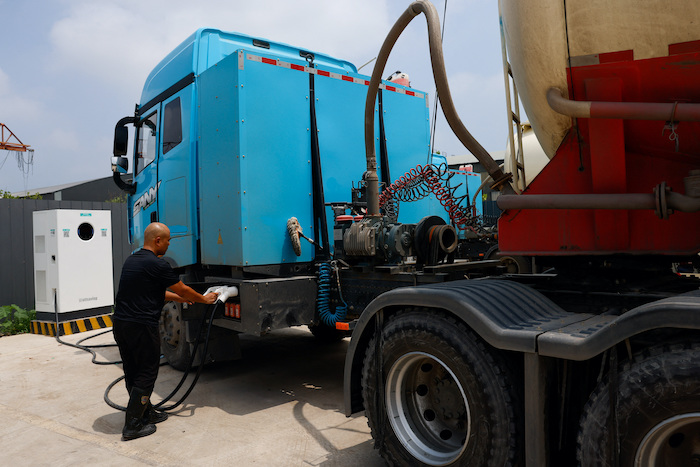Rapid pickup of electric-powered heavy trucks in China – helped by a quick rollout of chargers and subsidies – is curbing use of diesel fuel. And that’s a big win for the world’s biggest oil importer.
Sales of trucks that run on new energy are reported to have soared by 175% to 76,100 in the first half of this year, which is about a quarter of the market, according to consulting firm Sublime China Information (SCI).
Booming sales of electric trucks mirrors China’s adoption of electric cars and the rise in recent years of LNG-powered heavy trucks. Those factors, combined with slowing economic growth, have greatly eased the country’s consumption of oil.
ALSO SEE: Shares of China’s Solar Firms Jump Amid Moves to End Price War
Electric trucks have proven popular mostly for short-haul runs in ports, mines or steel mills, which accounted for over 90% of that increase.
The rapid pace has surprised analysts, who have revised down diesel demand forecasts as a result and brought forward their predictions for a peak in Chinese oil demand.
SCI’s analyst Xu Lei said he cut the firm’s China diesel demand expectations by 1%-2% given the boom in electric truck sales.
“The surge in electric heavy trucks was a surprise and has become a new factor accelerating China’s oil consumption to peak, most likely this year,” said Ye Lin, vice president at Rystad Energy, who had previously expected a 2026 peak.
Rystad: Sector will use 40% less diesel by 2030
The transport sector, which burns about two-thirds of all diesel in China, will use 40% less by 2030, cutting overall diesel consumption by about a quarter compared to 2024 levels, according to Rystad.
Diesel consumption this year is forecast to fall by 11.3 million tons, or 6.3%, on par with last year’s drop, according to SCI.
After more than six years behind the wheel of a diesel truck, Li Shuai, who drives for a cement plant in Hebei province near Beijing, switched to an electric truck six months ago.
“Charging infrastructure has improved noticeably in the past half year, making things much more convenient,” Li, 38, said. “It is even possible to drive an empty truck more than 2,000 km from Beijing to Yunnan to pick up goods without worry.”
The rapid buildup of charging infrastructure, primarily through industrial corridors, is underpinning adoption, although charge times that can stretch to 90 minutes and limited charger availability in some areas remain issues.
Teld, an EV charging infrastructure provider that has built more than 2,400 truck charging stations across China, officially opened an 800 km corridor in March linking Shanxi and Shandong provinces, a key route through the country’s coal-producing region.
At a charging station next to the Hebei cement plant, car and truck chargers sit side by side in the dusty lot. Owner Yongji Liu had originally only planned to service EVs but said “the electric truck market is growing so fast that we also installed chargers for trucks”.
‘Cheaper than LNG’
The booming market for electric trucks is partly due to cheap electricity and government subsidies introduced last July of up to 95,000 yuan ($13,264) for new vehicles, analysts and truckmakers said.
While diesel trucks are cheaper upfront, higher fuel costs make them more expensive after a million kilometres of driving.
Once fuel is included, diesel trucks cost about 2.25 million yuan ($314,000) at the million-kilometer mark, roughly 10% more than LNG trucks and 15% more than electric trucks, according to GL Consulting.
Rising fuel costs have also eroded some of the price advantage enjoyed by LNG trucks, which along with limited refueling stations in some regions, have hindered their growth, SCI analyst Wang Neng said.
SCI forecasts LNG truck sales to hit around 92,000 units in the first half, down 15% from a year earlier, although the surge in electric adoption is more than offsetting the impact on diesel consumption.
China’s second-best-selling electric truck maker Sany says the growth potential for electric trucks is greater than for passenger EVs because lower operating costs bolster the profitability of corporate users.
“We expect electric heavy trucks to account for 70% to 80% of new sales within as little as two to three years, driven by lower operating costs and more comprehensive charging infrastructure,” said Zhaoting Yue, SANY’s vice president of international marketing.
Reuters with additional editing by Jim Pollard
ALSO SEE:
How China’s New Auto Giants Raced Ahead of The World
China’s Criticism of Price Wars Sheds Light on Xi’s ‘Waning’ Power
China’s BYD Cuts Back on EV Production, Factory Expansions
Local Officials in China Backed Export of ‘Zero-Mileage Used Cars’
Chinese EV Firms Are So Done With BYD
BYD Plants Seen Generating Big Sales in Europe, South America
China’s Intense EV Price War Taking a Toll on Car Dealers
BYD’s Big Gains Give Chinese EV Rivals a Giant Headache
BYD Promises Driving Range of Over 2000km With New Hybrid Tech
Nearly One in Every Two Cars Sold in China Was Electric in 2024

